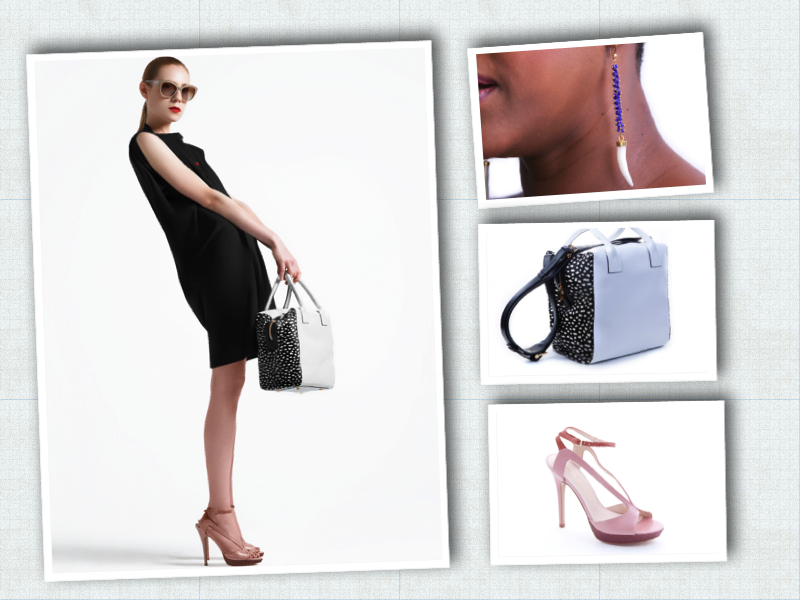This new online store proposes a selection of refined, high end fashion from Caribbean designers. Based in Martinique, Kameri offers a unique shopping experience in the online store. Founder and CEO, Ketty Cotrebil, worked with notable figures in the fashion industry such as Pierre Hardy, Karin Arabian, Bess Nielsen as well as clothing lines such as le Bon Marché and YOOX. Thereafter, she wished to create a virtual space that celebrates originality and diversity.
Kameri concept: how does it work?
Kameri is a platform that brings Caribbean designers together. Selected based on their style and manner of evoking the notion and feel of the Caribbean, designers showcase their exclusive pieces – dresses, accessories, blouses, handbags, shoes – for a limited time. In this way, there’s always a new, fresh fashion sense that prevails.
“The designers present their designs and fabrics before sending me the collection,” she explained. “When the articles are delivered, I post them online to be sold.”
Her acute, heightened fashion sense helps Ketty understand and predict fashion trends. Equipped with such foresight, she is aware of what’s hot and what’s not and, so, specializes in advising designers and assisting in the creation of their different collections.
At Kameri, Caribbean designers take advantage of this unique market place to present their fashion designs to the world.
Starting off: why fashion?
Some may say, why NOT fashion? From the onset, Ketty had deep passion for fashion so it comes as no surprise that she has started a fashion business.
“I always loved fashion,” she stated. “Growing up I was very fashion conscious and loved dressing up my friends.”
After completing her studies in fashion marketing and commerce in Paris, Ketty started off working in a high-end shoe store and this was where she learnt a lot about haute-couture fashion and luxury. She learnt how to interact with the customers. Daniel Yeremian, the owner of the store, was her mentor and gave her a lot of advice on running and owning a business. Later on in her career, she went on to collaborate with prominent fashion industry icons. After 10 years of experiences travelling the world, this lover of fashion and art decided to put her devotion to good use by making it the heart of her business.
In the beginning, she was undecided about the type of product she should sell and had difficulties working out all the administrative issues. After a comprehensive market study, however, Ketty knew exactly what her target market was. In 2013, she set up in an incubator. She learnt how to market her product, manage her funds, taxes and manage the business effectively.
“I used to work from home but it was a bit difficult. The experience is better in an incubator where you work side by side with other entrepreneurs,” she noted.
One can only imagine how time consuming it must be to successfully run a business single-handedly, but she devoted 100% of her time to the project and rose to the occasion to get the job done.
Funding was also difficult to come by when she first started off but associations like “Réseau Entreprendre” lent great support by advising her, fine-tuning her business plan and providing financial assistance.
Promotion and marketing
In order to continue attracting new designers, a press agent assists in the corporate communication arm of the business.
“I publish ads in a well-known magazine,” she elaborated. There’s also a newsletter published each month where designers are interviewed for the “Designer of the Month” spread that showcases the style and journey of each designer. Moreover, to better market the designers’ different fashion pieces a look book is also used.
“If you wish to have a pair of shoes, for example, the Look Book will match the shoes with clothes and accessories from other designers on the online store.”
She also frequents events like Paris Fashion Week in order to expand her fashion sense and, eventually, her business network.
Embracing Social Media in the fashion industry
Social media and fashion go hand in hand. It’s a natural fit and some may even argue that it’s even the best way to market your product. All it takes is a trendy hashtag and voilà!
“The website and social media, in particular, has been of great use in this regard,” comments Ketty. “We advertise pretty well via blogs, Facebook and Tweets.”
In embracing social media as a marketing tool, more emphasis is placed on the designer’s style and their fashion flair. You can also look out for smartphone applications that will help bring a new, unique shopping experience.
She works alone but will like to work with someone who complements her well. She also frequents events like Paris Fashion Week in order to expand her fashion sense and, eventually, her business.
To work alone, or not to work alone: that is the question
Many entrepreneurs start off building their company by themselves. They know exactly what they want and what must be done to get it. There’s a close symmetry between the way the company is run and their vision for its future. It’s the most perfect chemistry. However, having to run all the risks by yourself can sometimes be a burden and so a business associate is sought to help shoulder the work load. But this isn’t easy. Ketty describes it like a marriage. She works alone but will like to work with someone who complements her well.
“It’s important to work with someone who understands you and shares the same vision and passion,” she explains. “This is like a marriage between two people. Even if you’re hiring an intern, that person must understand where you’re taking the company. Complementarity is fundamental”
Surmounting Trade bottlenecks in the Caribbean
The import-export and trade related environment in the Caribbean region is faced with many logistic challenges. In the case of Kameri, the company was unduly imposed importation taxes for products that were to be re-exported to their final destination of consumption.
“To avoid the expenses, I went to customs to request a bonded warehouse. This in itself was a complicated process,” she details. “After getting the bank’s approval and finalizing the whole procedure, every time I had an incoming delivery I had to then explain the whole process to mail companies like DHL that I know longer need to pay duties which was not easy. In the end, I avoided having to pay almost 30% of the value of the merchandise.”
Getting your business off the ground is already a challenge in a capital constrained world. This is worsened by the lack of synergy between border control and goods clearance agencies in the Caribbean. At the regional level, there are many talks about enabling trade facilitation but there is still a lot of work to be done. According to Ketty, as a Caribbean entrepreneur the best solution is to remain pugnacious and motivated.











Comments are now closed for this article